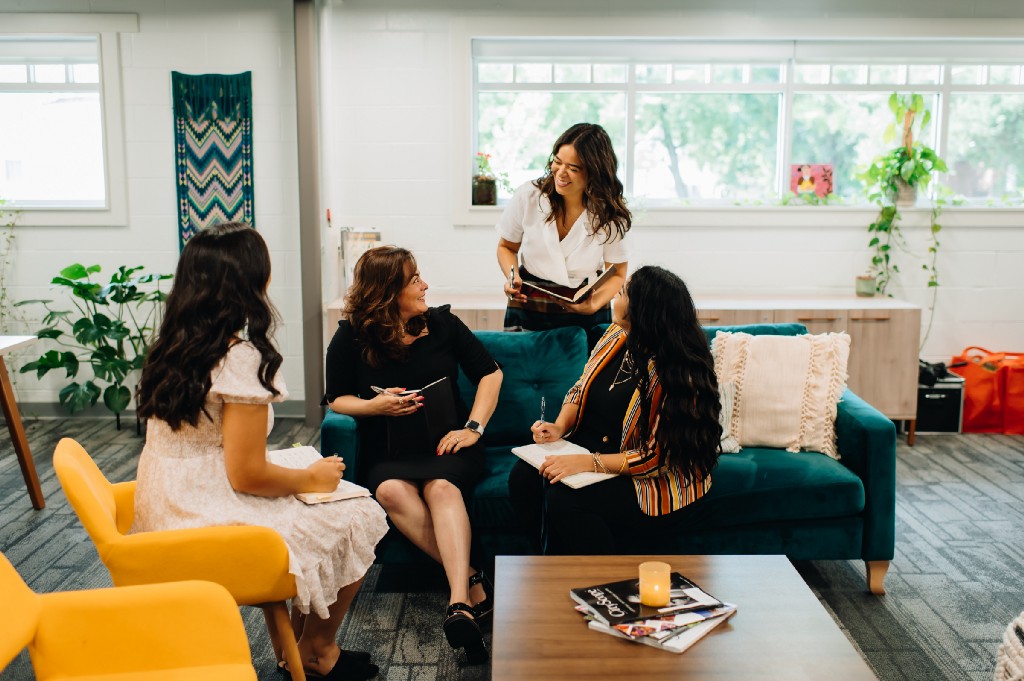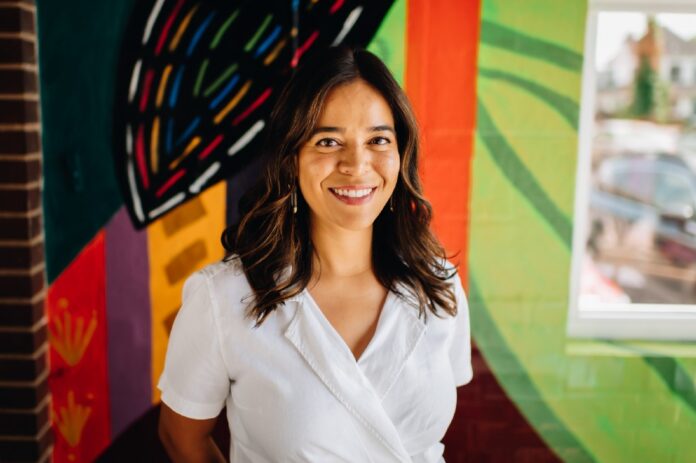Social Impact Heroes: Why & How Vivian Lozano-Sterchi of La Paz Chattanooga Is Helping To Change Our World
It’s okay not to know. As you gain new responsibilities, you may feel as though you have to know everything about them, but that’s simply not the case. A lot of the value of taking on a new responsibility is the learning experiences you gain along the way. You’re going to mess up sometimes — but if you’re willing to listen and learn, you’ll still grow.
As part of my series about “individuals and organizations making an important social impact”, I had the pleasure of interviewing Vivian Lozano-Sterchi.
Vivian Lozano-Sterchi is the director of social impact at La Paz Chattanooga, an organization that works to empower and engage its community’s Latino population through advocacy, education, and inclusion. A first-generation Colombian-American, Vivian focuses on creating programs and initiatives that offer support, resources, and opportunities to meet community needs. She also focuses on sustaining and creating partnerships with different agencies and organizations so that they can better serve the Latinx community in Chattanooga.
Thank you so much for joining us in this interview series! Can you tell us a story about what brought you to this specific career path?
I spent a good portion of my childhood in a community that didn’t speak my language growing up. My family is Colombian, and my mother doesn’t speak English. For a long time, we lived in Miami, Florida, which had a large, established Latino/Spanish-speaking community. But we moved to Northwest Georgia in the mid-90s where there wasn’t a Spanish-speaking community, and it was really hard to acclimate to that change. I saw how difficult it was for my mom to find resources and make connections with people because of that language barrier. As my siblings and I learned the language and culture, we acted as defacto translators. Many children of immigrants experience the same thing. As a result, I ended up wanting to help people when I grew up and pursued a career in social work.
Can you share the most interesting story that happened to you since you began leading your company or organization?
For everyone recently, it’s been the pandemic. In Chattanooga, the Latino community was hit so much harder. A lot of the people we serve were considered essential workers but weren’t always insured, and they were getting sick at a higher rate. Remember how challenging it was to stay up-to-date with the latest information as we all navigated something we’d never experienced? Now think about how difficult and scary it would have been if you didn’t speak the language most information was being distributed in. As an organization, we had to problem-solve in real-time. We didn’t get the opportunity to really think about a lot of things — we had to act.
It has been said that our mistakes can be our greatest teachers. Can you share a story about the funniest mistake you made when you were first starting? Can you tell us what lesson you learned from that?
I remember once years ago — my second week of work — that we had planned a furniture move-in day, and I came in wearing jeans and a comfortable shirt… because I thought I was going to be moving furniture! Instead, we had someone from the newspaper come to take photos. My coworkers were in suits and dresses, and there I was in jeans and a t-shirt. My takeaway? Always confirm the details!
Can you describe how you or your organization is making a significant social impact?
The immigrant community is relatively new to our area and continues to grow at a rapid pace. At La Paz, we have moved beyond the immediate response our organization was founded upon to a more long-term approach. Now, we’re problem-solving for the future and working to establish pathways for future generations of Latinos in our community. We’re building programs that connect children to educational resources and support the adults in their lives so that their children can thrive. We’re going beyond the surface level to ensure these members of our community are capable of advocating on their own behalf.
Can you tell us a story about a particular individual who was impacted or helped by your cause?
There are so many, but the biggest one that comes to mind is all the families we assisted during the COVID-19 pandemic. One of the programs we took on during that time was the Latinx Relief Fund, where we distributed over $250,000 to community members that didn’t qualify for any of the government relief programs. We created an entire application process and were able to give $500 to each family. We helped people make rent, pay utilities, and more. I’m really proud of our team for their hard work helping these families during such a difficult time.
Are there three things the community/society/politicians can do to help you address the root of the problem you are trying to solve?
1. Listen and learn. The best way to understand the real issues people are facing is to talk to them and the organizations that support them. You’ll often find that even programs established with good intentions may not actually be achieving the outcomes you thought they were. It’s important to have open conversations in an ongoing fashion so that you know what needs are now.
2. Be willing to have uncomfortable conversations. When you’re talking to people, you may find that their experiences are contrary to your preconceptions. Talking about things like systemic racism and lack of access to resources can be heavy. Be willing to sit with the discomfort and try to really put yourself in other people’s shoes.
3. Take action. We’d all be in a better place if we took the two steps above, but to affect change, you have to take action. Once you know what the issues and barriers are — and there are many — be willing to push for change (and to do the work to find out how to take effective action).
How do you define “Leadership”? Can you explain what you mean or give an example?
Leadership for me is listening to the people that you’re working with — and truly working WITH the individuals on your team. It’s working together toward a common goal. It’s ensuring all voices are being heard — not just one, and not just your own.

What are your “5 things I wish someone told me when I first started” and why. Please share a story or example for each.
1. It’s okay not to know. As you gain new responsibilities, you may feel as though you have to know everything about them, but that’s simply not the case. A lot of the value of taking on a new responsibility is the learning experiences you gain along the way. You’re going to mess up sometimes — but if you’re willing to listen and learn, you’ll still grow.
2. Ask clarifying questions. This one relates back to my “funny mistake” question! But I think people in their early careers may shy away from asking for additional clarity because they’re afraid of asking a “dumb question.” What we learn as we advance in our careers is that gaining clarity is a sign of maturity.
3. Lean on those with more experience. You can’t know what you don’t know, so when you find yourself in challenging situations, look to the people around you who have more experience than you do. Even if they don’t have the specific answers you need, they may be able to provide you with historical knowledge or a new perspective that will inform your next steps.
4. Go for it. If you’re too afraid to take action, you’ll never get anywhere. Be comfortable with the fact that everything won’t always be perfect — but sometimes it’s critical that you take that first step. You can modify as you move forward and make changes along the way. Your first effort doesn’t always have to be the final product.
5. Have fun. The work is hard, so make sure you surround yourself with supportive people.
You are a person of enormous influence. If you could inspire a movement that would bring the most amount of good to the most amount of people, what would that be? You never know what your idea can trigger. 🙂
For people to be less motivated by their own self-interest. This can be a challenging exercise, but I think we’d all be in a better place if we stopped thinking about everything from a “me” perspective — “Do I have enough?” — and started thinking along the lines of, “Are we all being taken care of?”
Can you please give us your favorite “Life Lesson Quote”? Can you share how that was relevant to you in your life?
“Ponte las pilas” — the direct translation is essentially “put in your batteries.” It means “go for it,” “do your best,” “work harder.”
Is there a person in the world, or in the US with whom you would like to have a private breakfast or lunch with, and why? He or she might just see this, especially if we tag them. 🙂
Serena Williams, she is the GOAT. She is an amazing inspiration to so many girls and women around the world, including myself. What she has managed to do beyond the world of tennis is inspiring, and even though she has just retired, she’s a great example of how change can be a wonderful, exciting experience, not just a scary one.
How can our readers further follow your work online?
Website: https://www.lapazchattanooga.org/
Facebook: https://www.facebook.com/LaPazChatt
Twitter: https://twitter.com/lapazchatt
Instagram: https://www.instagram.com/lapazchatt/
This was very meaningful, thank you so much. We wish you only continued success on your great work!
Social Impact Heroes: Why & How Vivian Lozano-Sterchi of La Paz Chattanooga Is Helping To Change… was originally published in Authority Magazine on Medium, where people are continuing the conversation by highlighting and responding to this story.


